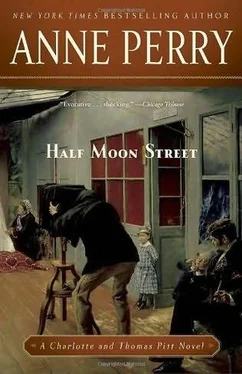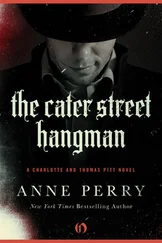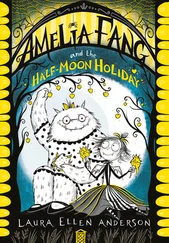Anne Perry - Half Moon Street
Здесь есть возможность читать онлайн «Anne Perry - Half Moon Street» весь текст электронной книги совершенно бесплатно (целиком полную версию без сокращений). В некоторых случаях можно слушать аудио, скачать через торрент в формате fb2 и присутствует краткое содержание. Жанр: Исторический детектив, на английском языке. Описание произведения, (предисловие) а так же отзывы посетителей доступны на портале библиотеки ЛибКат.
- Название:Half Moon Street
- Автор:
- Жанр:
- Год:неизвестен
- ISBN:нет данных
- Рейтинг книги:4 / 5. Голосов: 1
-
Избранное:Добавить в избранное
- Отзывы:
-
Ваша оценка:
- 80
- 1
- 2
- 3
- 4
- 5
Half Moon Street: краткое содержание, описание и аннотация
Предлагаем к чтению аннотацию, описание, краткое содержание или предисловие (зависит от того, что написал сам автор книги «Half Moon Street»). Если вы не нашли необходимую информацию о книге — напишите в комментариях, мы постараемся отыскать её.
Half Moon Street — читать онлайн бесплатно полную книгу (весь текст) целиком
Ниже представлен текст книги, разбитый по страницам. Система сохранения места последней прочитанной страницы, позволяет с удобством читать онлайн бесплатно книгу «Half Moon Street», без необходимости каждый раз заново искать на чём Вы остановились. Поставьте закладку, и сможете в любой момент перейти на страницу, на которой закончили чтение.
Интервал:
Закладка:
“Of course it is, my dear,” her husband assured her. “It seems he does not appreciate the harm his laxity is doing.”
Caroline glanced at Joshua. She knew his views on censorship, and she was afraid he would say something which would offend the Marchands, but she did not know how to prevent it without in turn hurting him. “It is a difficult decision,” she said tentatively.
“It may require courage,” Mrs. Marchand replied without hesitation. “But if he accepts the office then we have the right to expect that much of him.”
Caroline could understand exactly what she meant. She knew instinctively her concerns, and yet she was equally sure Joshua would not. She was surprised how moderate his answer was when he spoke.
“Protection is a double-edged sword, Mrs. Marchand.” He did not move from his relaxed position against the corner of the balcony, but Caroline could see the more angular lines of his body as his muscles tensed.
Mrs. Marchand looked at him guardedly. “Double-edged?” she enquired.
“What is it you would like to be protected from?” Joshua kept his voice level and gentle.
Mr. Marchand moved slightly, only a changing of weight.
“From the corruption of decency,” Mrs. Marchand replied, anger and certainty ringing in her tone. Unconsciously she put her hand towards her husband. “From the steady destruction of our way of life by the praising of immorality and selfishness. The teaching of young and impressionable people that self-indulgence is acceptable, even good. The exhibiting in public of emotions and practices which should remain private. It cheapens and demeans that which should be sacred. . ”
Caroline knew what she meant, and she more than half agreed with her. The Marchands had a young son, about sixteen years old. Caroline could remember when her daughters were that age, and how hard she had worked to guide and protect them. It had been less difficult then.
She looked at Joshua, knowing he would disagree. But then he had never had children, and that made a world of difference. He had no one to protect in that passionate way that demanded all commitment.
“Is self-denial better than self-indulgence?” Joshua questioned.
Mrs. Marchand’s dark eyebrows rose. “Of course it is. How can you need to ask?”
“But is not one person’s self-denial only the reverse side, the permission, if you like, for another’s self-indulgence?” he asked. He leaned forward a little. “Take the play, for example. When the wife denied herself, was she not making it possible for the husband to delude and indulge himself?”
“I. .” Mrs. Marchand began, then stopped. She was convinced she was right, but not sure how to explain it.
Caroline knew what she meant. The husband’s suffering was public, his wife’s had been private, one of the many things one did not speak of.
“She is disloyal,” Mr. Marchand said for his wife. His voice was not raised in the slightest, but there was a ring of unshakable conviction in it. “Disloyalty can never be right. We should not portray it as such and seek sympathy for it. To do so confuses people who may be uncertain. Women may be led to feel that the wife’s behavior is excusable.”
The smile stayed fixed on Joshua’s face. “And on the other hand, men may be led to question if perhaps their wives have as much need, even right, to happiness as they have,” he countered. “They may even realize that life would be better for both of them if they were to understand that women cannot be married and then safely considered to be purchased, for use when desired, like a carpet sweeper or a clothes mangle.”
Mr. Marchand looked confused. “A what?”
“A clothes mangle,” Joshua replied with a sudden shift to lightness. “A machine for wringing the excess water out of laundry.”
“I have no idea what you mean!” Marchand looked at Caroline.
But it was Pitt who interpreted for him. “I think what Mr. Fielding is saying is that one person’s protection may be another person’s imprisonment; or one person’s idea of freedom another’s idea of license,” he explained. “If we refuse to look at anyone else’s pain because it is different from ours and makes us feel uncomfortable-or because it is the same and embarrasses us-then we are neither a liberal nor a generous society, and we will slowly suffocate ourselves to death.”
“Good heavens!” Mr. Marchand said softly. “You are very radical, sir.”
“I thought I was rather conservative,” Pitt said with surprise. “I found the play distinctly uncomfortable as well.”
“But do you think it should be suppressed?” Joshua said quickly.
Pitt hesitated. “That’s a harsh step to take. . ”
“It subverts decency and family life,” Mrs. Marchand put in, leaning forward over her taffeta skirts, her hands folded.
“It questions values,” Joshua corrected. “Must we never do that? Then how can we grow? We shall never learn anything or improve upon anything. Worse than that, we shall never understand other people, and perhaps not ourselves either.” His face was keen, the emotion naked now as he forgot his intended moderation. “If we do that we are hardly worth the nobility of being human, of having intelligence, freedom of will, or the power of judgment.”
Caroline could see the imminent possibility of the discussion’s becoming ugly and a friendship’s being lost.
“It is a matter of how they are questioned,” she said in haste.
Joshua regarded her seriously. “The image that has the power to disturb is the only one that has the power to change. Growth is often painful, but to not grow is to begin to die.”
“Are you saying everything perishes sooner or later?” Mr. Marchand asked. He sounded almost casual, but there was a rigidity in his hands, in his body, which belied any ease. “I don’t believe that. I am sure there are values which are eternal.”
Joshua straightened up. “Of course there are,” he agreed. “It is a matter of understanding them, and that is more difficult. One must test the truth often, or it will become polluted by ignorance and misuse.” He smiled, but his eyes were steady. “It’s like the dusting in a good household. It has to be done every day.”
Hope Marchand looked puzzled. She glanced at Caroline, then away again.
Mr. Marchand offered her his arm. “I think it is time we returned to our seats, my dear. We don’t wish to spoil other people’s enjoyment by disturbing them when the performance has begun.” He turned to Caroline. “So nice to see you again, Mrs. Fielding.” Then to Pitt and to Joshua he added, “And to meet you, Mr. Pitt. I hope you enjoy the evening.” A moment later they were gone.
Caroline took a deep breath and let it out slowly.
Joshua grinned at her. The expression lit his face with warmth and laughter, and her fear evaporated. She wanted to warn him how close he had come to confusing and hurting people, to explain why they were afraid, but her anger evaporated, and instead she simply smiled back.
The lights dimmed and the curtain rose for the second act.
Caroline directed her attention to the stage, where the drama continued to develop. It could only end in tragedy. The character played by Cecily Antrim hungered for more passion in life than the society in which she was could either give or understand. She was trapped among people who were increasingly disturbed and frightened by her.
Her husband would not divorce her, and she had no power to divorce him and no justification to leave. Even her misery was from no cause she could explain to anyone who did not share it.
Whether she could ever have behaved differently was a question not yet raised, but Caroline was asking herself even while the scene was playing itself out in front of her. She did not wish to identify with Cecily Antrim, a creature of ungovernable emotions, wayward, indiscreet, allowing far too much of herself to be known, and in so doing betraying the inner thoughts of all women.
Читать дальшеИнтервал:
Закладка:
Похожие книги на «Half Moon Street»
Представляем Вашему вниманию похожие книги на «Half Moon Street» списком для выбора. Мы отобрали схожую по названию и смыслу литературу в надежде предоставить читателям больше вариантов отыскать новые, интересные, ещё непрочитанные произведения.
Обсуждение, отзывы о книге «Half Moon Street» и просто собственные мнения читателей. Оставьте ваши комментарии, напишите, что Вы думаете о произведении, его смысле или главных героях. Укажите что конкретно понравилось, а что нет, и почему Вы так считаете.












